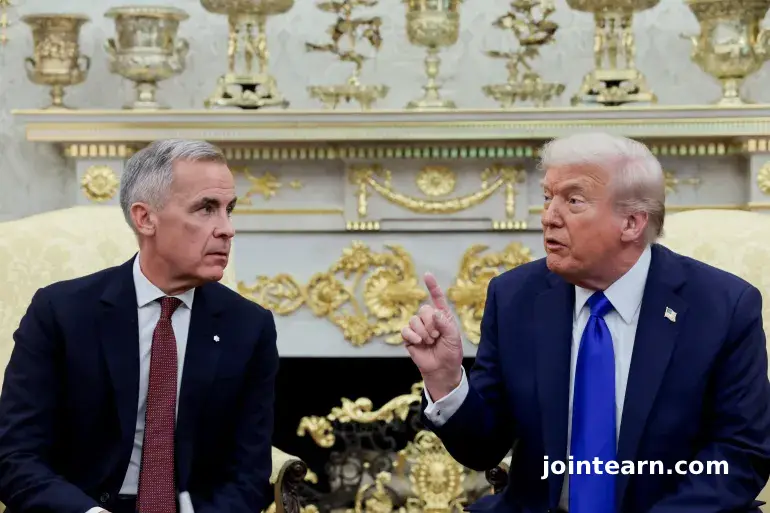
U.S. President Donald Trump announced that trade negotiations with Canada will not resume, citing a controversial political advertisement from Ontario that misrepresented former President Ronald Reagan’s stance on tariffs. Despite Canadian Prime Minister Mark Carney apologizing for the ad, Trump insisted that the disruption to trade talks remains unresolved.
The Controversial Advertisement
The Ontario political advertisement featured edited clips of Reagan, a Republican icon, warning that tariffs on foreign goods could lead to trade wars and job losses.
- Trump described the ad as “false”, saying it misrepresented Reagan’s position.
- He emphasized that while Carney apologized for the commercial, the United States would not restart trade negotiations.
- Ontario Premier Doug Ford temporarily paused the ad campaign in hopes of resuming talks, but Trump has maintained his stance.
Trump stated:
“I like him a lot, but what they did was wrong. He apologized for what they did with the commercial because it was a false commercial.”
Carney has not publicly responded to the latest statement from the U.S. President.
Impact on US-Canada Trade Relations
The controversy comes amid ongoing trade tensions between the two North American neighbors:
- Last week, Trump canceled negotiations and imposed an additional 10 percent tariff on Canadian goods.
- Historically, Canada has relied on the U.S. as its largest trading partner, sending approximately 75 percent of its exports south of the border.
- Canadian industries, particularly manufacturing and natural resources, have been significantly impacted by prior U.S. tariffs.
Trade experts warn that prolonged disruptions could strain economic ties and affect markets across North America, particularly sectors dependent on cross-border supply chains.
Reagan, Free Trade, and Political Misrepresentation
Ronald Reagan was historically a proponent of free trade and market liberalization, which contrasts with the narrative in the Ontario ad. Analysts note that splicing Reagan’s speeches to create a message against tariffs constitutes misrepresentation, even if the individual lines were accurate.
- The one-minute advertisement selectively combined portions of Reagan’s speeches, creating a misleading impression of his position.
- Trump’s criticism reflects a broader sensitivity to foreign interference and public messaging in U.S.-Canada relations.
Future of Trade Talks
While Canada has expressed willingness to return to the negotiating table, Trump remains firm in his decision to pause all trade negotiations until the issue surrounding the advertisement is fully resolved.
- Ontario’s temporary ad suspension does not appear sufficient to restart formal talks.
- Economic analysts predict that tariffs could remain in place, affecting Canadian exporters and bilateral trade volumes well into 2026.
The impasse underscores how political messaging and media controversies can directly influence international trade negotiations.
Conclusion
The U.S.-Canada trade dispute highlights the delicate intersection of political campaigns, historical figures, and economic policy. Even with apologies from Canadian officials, Trump’s decision to suspend talks signals ongoing tensions that could continue to impact trade and economic stability in North America.
The resolution of this controversy will likely require diplomatic negotiations at the highest levels and may shape U.S.-Canada economic relations for years to come.


Leave a Reply